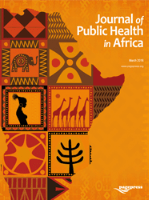
Journal of Public Health in Africa
Scope & Guideline
Advancing public health knowledge across Africa.
Introduction
Aims and Scopes
- Epidemiological Studies:
The journal frequently publishes research on the prevalence and risk factors of various diseases, including infectious and non-communicable diseases, thereby contributing to the understanding of public health challenges in Africa. - Health Systems and Policy Analysis:
Research articles often explore the effectiveness of health policies, healthcare delivery systems, and the socio-political factors influencing health outcomes, highlighting the need for evidence-based policy-making. - Community Health Interventions:
The journal emphasizes community-based health programs and interventions aimed at improving health literacy, preventive health measures, and health-seeking behaviors among populations. - Infectious Disease Surveillance and Control:
With a focus on emerging infectious diseases, the journal publishes studies on surveillance, outbreak response, and the impact of public health measures, especially in the context of the COVID-19 pandemic. - Public Health Education and Training:
The journal supports research on educational initiatives for health professionals and community members, aiming to enhance knowledge and practices related to public health.
Trending and Emerging
- Impact of COVID-19 on Public Health:
Research exploring the multifaceted impacts of the COVID-19 pandemic is trending, including studies on mental health, healthcare service utilization, and vaccination strategies. - Health Equity and Social Determinants:
There is an increasing focus on health equity, exploring how social determinants affect health outcomes, particularly in marginalized communities across Africa. - Digital Health Innovations:
Emerging themes in digital health, including telemedicine and mobile health applications, are becoming more prominent as mechanisms to improve healthcare access and efficiency. - Mental Health Awareness:
Recent trends indicate a growing recognition of mental health issues, particularly in the context of pandemics and their socio-economic impacts, highlighting the need for integrated mental health services. - Antimicrobial Resistance and Infection Control:
Research on antimicrobial resistance is increasingly relevant, focusing on strategies for effective infection control and stewardship programs in healthcare settings.
Declining or Waning
- Traditional Infectious Disease Research:
There appears to be a waning focus on traditional infectious diseases that were once prevalent in earlier publications, as newer topics related to emerging diseases and health system resilience take precedence. - Chronic Disease Management:
Research specifically targeting chronic diseases, though still relevant, has decreased in frequency as the emphasis shifts towards immediate public health responses to emergent health crises like COVID-19. - Basic Health Infrastructure Studies:
The journal has seen a reduction in studies solely focused on basic health infrastructure assessments, with more emphasis now placed on integrated health system approaches and policy evaluations.
Similar Journals
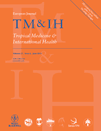
TROPICAL MEDICINE & INTERNATIONAL HEALTH
Advancing global health through innovative research.Tropical Medicine & International Health is a distinguished journal published by Wiley, dedicated to the exploration and dissemination of cutting-edge research in the fields of infectious diseases, parasitology, and public health. With a robust open-access option, the journal facilitates the widespread sharing of information critical to addressing health issues in tropical and international settings. Since its inception in 1996, it has established a significant presence in the academic community, as indicated by its impressive ranking in various Scopus categories, notably positioned in the Q1 quartile for Parasitology and Q2 for both Infectious Diseases and Public Health, reflecting its high influence within these domains. The journal's commitment to advancing knowledge on health challenges prevalent in tropical environments makes it an invaluable resource for researchers, healthcare professionals, and students alike who are dedicated to improving global health outcomes.

JAMA Health Forum
Connecting Experts to Tackle Global Health ChallengesIntroducing the JAMA Health Forum, a premier journal published by the American Medical Association, dedicated to advancing knowledge in the critical fields of health policy and public health. Since its inception in 2020, this open-access journal has emerged as a leading platform for high-quality research, achieving a distinguished Q1 ranking in both Health Policy and Public Health, Environmental and Occupational Health for 2023. With an ISSN of 2689-0186, it provides a vital resource for researchers, policymakers, and students alike, facilitating widespread dissemination of impactful studies that aim to shape health strategies and improve community health outcomes. The JAMA Health Forum not only fosters collaboration among experts but also enhances global discussions on pressing health issues, making it an essential read for anyone involved in health-related research and practice.

Pravention und Gesundheitsforderung
Empowering health professionals through innovative insights.Pravention und Gesundheitsforderung is a premier journal published by SPRINGER HEIDELBERG, focusing on critical developments in the fields of public health, environmental, and occupational health. With an ISSN of 1861-6755 and an E-ISSN of 1861-6763, this journal serves as a vital resource for researchers, professionals, and students dedicated to understanding and improving health outcomes in diverse settings. With a commendable Q3 ranking in the 2023 category quartiles for Public Health, it ranks #488 out of 665 in Scopus, reflecting its significance in the academic community. Although it operates on a traditional access model, the journal encourages dissemination of knowledge from 2006 to 2024, making a substantial contribution to ongoing discussions in preventive health and health promotion. Situated in the heart of Germany at TIERGARTENSTRASSE 17, D-69121 HEIDELBERG, Pravention und Gesundheitsforderung is indispensable for anyone seeking to stay at the forefront of health-related research and practices.
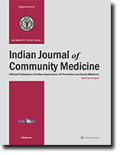
Indian Journal of Community Medicine
Connecting Research, Practice, and Policy in Community MedicineIndian Journal of Community Medicine, with its ISSN 0970-0218 and E-ISSN 1998-3581, operates under the esteemed Wolters Kluwer Medknow Publications. This peer-reviewed, open access journal, established in 2005, has been at the forefront of disseminating research in the fields of public health, community medicine, and environmental health, forging connections among researchers, practitioners, and policymakers in India and beyond. With a notable impact factor and a Q3 ranking in Public Health, Environmental and Occupational Health for 2023, this journal maintains a commitment to improving community health through empirical research, policy analysis, and best practice sharing. The journal is pivotal not only in addressing prevalent health issues but also in fostering innovative solutions tailored to the unique challenges faced by diverse communities. With publication convergence from 2009 to 2024, the Indian Journal of Community Medicine continues to serve as a vital resource for academics, professionals, and students looking to contribute to and engage with the evolving landscape of community health research.
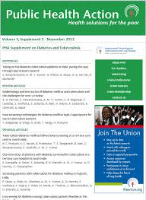
Public Health Action
Championing the fight against communicable diseases.Public Health Action, published by the International Union Against Tuberculosis and Lung Disease (IUATLD), is a pivotal open-access journal dedicated to advancing knowledge and practice in the fields of public health and health policy. Since its inception in 2011, the journal has provided a platform for innovative research and impactful discussions that shape the future of public health, with an emphasis on combating tuberculosis and other communicable diseases. With an ISSN of 2220-8372 and a presence in Scopus, the journal is ranked #110 in Health Policy and #249 in Public Health, Environmental and Occupational Health, showcasing its commitment to quality and relevance in its field. Housed in Paris, France, Public Health Action invites researchers, professionals, and students to explore cutting-edge research that informs policy and practice and contributes to the global fight against diseases. By offering open access to its content, the journal ensures that vital information remains accessible to a diverse audience, fostering collaboration and innovation worldwide.

Archives of Public Health
Pioneering the future of public health research and discourse.Archives of Public Health, published by BMC, is an esteemed open-access journal dedicated to advancing knowledge in the fields of public health, environmental health, and occupational health. With an ISSN of 0778-7367 and an E-ISSN of 2049-3258, this journal has maintained a prestigious position in its category, achieving a Q1 ranking in the latest 2023 metrics. Operating since 1996, and fully open access since 2011, it strives to disseminate pioneering research, innovative public health strategies, and critical reviews that benefit both academia and practice. The journal holds a notable Scopus rank of #192 out of 665, situating it in the 71st percentile within the medicine category. Based in the United Kingdom, its mission is to provide a platform for researchers, practitioners, and students to share and discuss groundbreaking findings that influence policy and practice in public health globally. As a vital resource for professionals dedicated to health improvement, the Archives of Public Health serves as an essential touchstone for contemporary public health discourse.

Pan African Medical Journal
Elevating the standard of medical research in Africa.Pan African Medical Journal, published by the African Field Epidemiology Network (AFENET), is a pivotal open access journal dedicated to advancing the fields of general medicine and public health in Africa and beyond. Since its inception in 2008, this journal has served as a vital resource for disseminating high-quality research articles, reviews, and case studies that address critical health issues across the continent. With an admirable Q3 category ranking in 2023 and a commendable Scopus ranking in the 59th percentile among general medicine journals, it plays an essential role in promoting scientific discourse and innovation within the medical community. The journal's expansive scope encourages contributions that offer diverse perspectives on medicine, epidemiology, and public health challenges unique to the African context. Operating out of Nigeria, the journal invites researchers, professionals, and students to engage with its content and contribute to a growing body of knowledge that drives progress in health outcomes across the region.

Iranian Journal of Public Health
Transforming public health insights into actionable change.Iranian Journal of Public Health is a premier publication dedicated to advancing the field of public health research. Established in 2001 and published by the Iranian Scientific Society Medical Entomology, this Open Access journal provides an invaluable platform for disseminating innovative findings and practices aimed at addressing public health challenges both locally and globally. With its roots tracing back to 1973, the journal has evolved through multiple converged years, reflecting a rich history of commitment to the health sciences. Currently categorized in Q3 within Public Health, Environmental, and Occupational Health, as per the 2023 rankings, it ranks 406 out of 665 in the Scopus database, placing it in the 39th percentile. This significant positioning underscores its role in fostering high-quality research that informs policy and enhances community health outcomes. The editorial team is dedicated to upholding rigorous academic standards while embracing diverse perspectives that resonate within the dynamic landscape of public health. It is an essential resource for researchers, professionals, and students alike, fostering collaborative efforts in the relentless pursuit of health equity and sustainability.

Lancet Global Health
Advancing global health through innovative research.Lancet Global Health (ISSN: 2214-109X) is a leading open-access journal published by Elsevier, renowned for its commitment to disseminating high-quality research in the field of global health. Established in 2013, this esteemed journal has quickly ascended to become one of the top-ranked publications in its category, achieving a remarkable Q1 ranking in Medicine (Miscellaneous) and placing in the 98th percentile of general medicine according to Scopus. With a focus on innovative research and impactful studies, the Lancet Global Health aims to foster dialogue and dissemination of knowledge across disciplines, addressing pressing health issues effectively. The journal provides open access to its content, ensuring that vital information reaches a broad audience, including researchers, health professionals, and policy-makers. As it continues to bridge gaps in global health research and practice through its rigorous peer-reviewed articles, Lancet Global Health plays a crucial role in shaping the future of health equity and social justice worldwide.
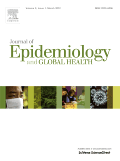
Journal of Epidemiology and Global Health
Unlocking the potential of open-access research for a healthier world.The Journal of Epidemiology and Global Health (ISSN: 2210-6006; E-ISSN: 2210-6014), published by SpringerNature, stands as a premier open-access platform in the field of epidemiology, dedicated to advancing our understanding of global health challenges since 2011. Based in Switzerland, this journal is recognized for its significant contributions to the discipline, achieving an impressive Q1 ranking in Epidemiology and positioning itself at the 88th percentile within the Scopus Medicine - Epidemiology category. With a goal to disseminate innovative research and foster dialogue among scholars, public health professionals, and students, the journal provides a rich repository of empirical studies, reviews, and theoretical contributions that address pressing epidemiological issues. Its commitment to open access ensures that vital research is freely available to the global community, thereby amplifying its impact and relevance. Researchers seeking to publish and access high-quality, peer-reviewed articles will find the Journal of Epidemiology and Global Health an invaluable resource in navigating the ever-evolving landscape of public health.